New Faces
UMBC was recently named once again as a Great College to Work For in a national poll of employees conducted by the Chronicle of Higher Education, so its no surprise that the university is attracting stellar new talent to its faculty and academic leadership.
We asked six newly appointed leaders and faculty at UMBC what attracted them to join our community.
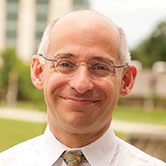 Scott E. Casper is UMBCs new dean of the College of Arts, Humanities and Social Sciences (CAHSS). He comes to the university from the University of Nevada, Reno, where he was interim dean of the College of Liberal Arts and a professor of history.
Scott E. Casper is UMBCs new dean of the College of Arts, Humanities and Social Sciences (CAHSS). He comes to the university from the University of Nevada, Reno, where he was interim dean of the College of Liberal Arts and a professor of history.
As I learned more about UMBC, I particularly appreciated its commitment to a world-class undergraduate education for all of our students, including honors-level experiences and community engagement; its growing profile as a research university in the arts, humanities, and social sciences; and the broad participation of faculty and staff in charting the university’s course.
I’m especially excited by the range of disciplines and programs within CAHSS. We span the disciplines (Theatre to Geography & Environmental Systems), the centuries (Ancient Studies to Media and Communication Studies), and the globe (Asian Studies, Africana Studies, and now Global Studies). During my interview, I had the pleasure of meeting several outstanding, recently hired faculty members, as well as students in CAHSS’s Scholars programs (Sondheim, Linehan, and Humanities) — and those conversations demonstrated how UMBC lives its vision.
I was also really attracted to our location, because I’m a historian of the 19th-century United States who has done substantial work in this area specifically at Mount Vernon and because I grew up in Virginia and have family not far away.
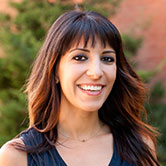 Viviana MacManus is an assistant professor of gender and womens studies. She received her Ph.D. at the University of California, San Diego in the department of literature in 2011. That same year, MacManus was named as one of UMBC postdoctoral fellows for faculty diversity a program designed to support promising scholars who are committed to diversity in the academy and prepare them for possible tenure track appointments at the university.
Viviana MacManus is an assistant professor of gender and womens studies. She received her Ph.D. at the University of California, San Diego in the department of literature in 2011. That same year, MacManus was named as one of UMBC postdoctoral fellows for faculty diversity a program designed to support promising scholars who are committed to diversity in the academy and prepare them for possible tenure track appointments at the university.
I feel welcome and wanted here. The warm and supportive community within the department of gender and womens studies was a major reason why I stayed at UMBC. I felt supported intellectually, community-wise on campus, and personally. I had the support that I needed to succeed.
It also said a lot to me that UMBC valued the liberal arts and humanities enough to invest in hiring new faculty in gender and womens studies, and investing in the humanities overall. The fellowship gave me time and support to transition from graduate school to the faculty. I designed my own classes, but also had the time to do my own research. I learned how to balance that, which I think is hard for new faculty right out of graduate school.
I think Im super fortunate. I keep telling everyone that I think I won the jackpot.
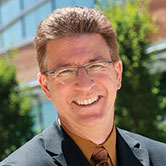 Karl V. Steiner is UMBCs new vice president for research. Steiner arrived on campus in late August from the University of Delaware, where he was senior associate provost for research development and a professor of electrical and computer engineering and biomedical engineering.
Karl V. Steiner is UMBCs new vice president for research. Steiner arrived on campus in late August from the University of Delaware, where he was senior associate provost for research development and a professor of electrical and computer engineering and biomedical engineering.
Coming from the University of Delaware, I have known about UMBC and the exciting developments underway on this campus for some time. When I was approached about the position of vice president for research, I took a closer look at the campus and its research portfolio, and I was positively impressed by the existing research activities and the strengths of the faculty on this campus. There also was a clear sense of pride across the UMBC community about how far this campus has developed over the past two decades in its relatively young history, and an expressed desire to expand the research impact of UMBC.
My goal is now to work with the faculty and with campus leadership to position UMBC to grow its research engine, to put in place or strengthen the infrastructure required to compete at the next level, to establish innovative and mutually beneficial collaborations with local, regional and national partners, and to serve as a catalyst, promoting the unique strengths of UMBC within the state and on the national level.
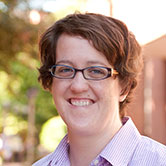 Erin Green is an assistant professor of biological sciences. She took her Ph.D. at University of California, Berkeley and arrives at UMBC fresh from postdoctoral work at Stanford University.
Erin Green is an assistant professor of biological sciences. She took her Ph.D. at University of California, Berkeley and arrives at UMBC fresh from postdoctoral work at Stanford University.
I was drawn to UMBC because it promotes excellence in both scientific research and undergraduate and graduate education. The department of biological sciences offers me a great opportunity to work with accomplished and dedicated colleagues, pursue cutting-edge research and interact with a talented and diverse pool of students. Also, being surrounded by the biomedical research hub centered in the Baltimore/Washington DC region will enrich my research program and provide a stimulating learning environment for my students.
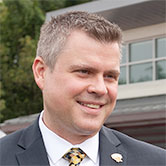 Tim Hall is UMBCs new director of athletics, physical education and recreation. Hall comes to UMBC from the University of Missouri-Kansas City (UMKC), where he was director of athletics for six years.
Tim Hall is UMBCs new director of athletics, physical education and recreation. Hall comes to UMBC from the University of Missouri-Kansas City (UMKC), where he was director of athletics for six years.
UMBCs commitment to the comprehensive student-athlete experience was one of the main attractions for me. Academic success and athletics success are not seen as mutually exclusive at UMBC.
The faculty and staff of this university are first rate. And Freeman A. Hrabowski, III is one of the finest leaders in higher education. Having the opportunity to work for him and learn from him was another thing I found very appealing.
I am also proud to lead a department that is part of one of the finest divisions of student affairs in higher education. Maryland is also a beautiful part of the country, and it is close to our home in northeast Ohio.
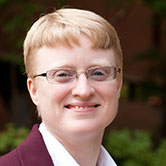 Rachael K. Hinkle is an assistant professor of political science. She comes to UMBC from Washington University in St. Louis, where she received her Ph.D. in May. She also received a J.D. with high distinction from Ohio Northern University College of Law in 2003.
Rachael K. Hinkle is an assistant professor of political science. She comes to UMBC from Washington University in St. Louis, where she received her Ph.D. in May. She also received a J.D. with high distinction from Ohio Northern University College of Law in 2003.
The major thing that attracted me to UMBC was the sense of campus-wide determination to excel in both teaching and research. I decided to pursue an academic career because I enjoy and thrive in both environments, so I was excited to join a university which would both push me to maximize my potential in teaching and research, and also provide me with the resources necessary to do so.
The political science department at UMBC is full of people who are both amazing scholars and amazing people. Their support and advice will be invaluable as I launch my career.
(9/18/13)

